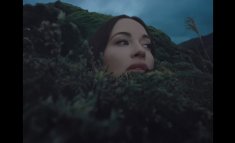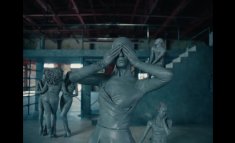
Director Joseph Kahn calls it one of his best videos, but notes that he's referring to the "unseen" version before correcting himself, rechristening it the "never to be seen" version.
He's referring to the Director's Cut of Britney Spears "Perfume," an unreleased version of the video that generated a whole lot of intrigue and interest online, including even a petition for its release.
It was an unavoidable topic when Kahn and I recently connected to talk about his career and music videos in general. And although he's know to be outspoken and iconoclastic — how many other directors would have the sack to publicly declare that his cut of "Perfume" is not only the better video, but his best video ever? — he's also rarely full of shit. And the Director's Cut of "Perfume" is indeed the kind of video that would have generated way more talk and controversy than the skirmish we've seen over whether the "Director's Cut" would be released or not. Trust me. Or, rather, trust Joseph Kahn.
Read on for our conversation about all this and much more...
Videostatic: I hate to start with the origin story, but you began making music videos way before the Internet and even before the digital filmmaking revolution, and I think people would be surprised to learn you began by making hip-hop videos for Rap-A-Lot and other Houston hip-hop labels. How'd you get started with them and what was the hustle like in making those early videos?
Joseph Kahn: I dropped out of NYU in 1992, moved back to Houston, and started making rap videos for gangsters, drug dealers, and pimps. I was a skinny Asian guy with a bad $10 haircut driving all around Texas chasing any leads I could, showing a $2,000 music video I made at film school. I ended up making 30 videos in two years for around $10k each. I had to do everything - dp, edit, produce, feed people, clean floors, whatever. I think I got a lot of jobs by default because crews were too scared to shoot in the neighborhoods I was going into, but I thought it was really cool. And because I wore so many hats at the same time, I could keep the costs down. When I started I didn't use cell phones, barely used computers, but within a year I had a production company with an office and 5 full time employees. I probably would have kept doing it if it weren't for the fact I couldn't get a date to save my life, so I shut it down and got the fuck out of Texas as fast as I could. I was 21. What do you expect.
VS: What was the first video where you realized, ok, this is getting big? The first video that really put you on my radar was Korn "ADIDAS," which just played awesomely both from a conceptual standpoint — a video about death for a song about sex — and in terms of production values. For others, I can imagine the Aaliyah "If Your Girl Only Knew" being the entry point for your work, since it was a hit song for a big artist.
JK: It's hard to pinpoint when things started getting "big" for me. Nothing happened overnight. For years I was considered a hack because I made gangster rap videos, and no one took that seriously. But in my view rock video directors had it easy - they weren't forced to shoot rims, women, stacks of hundred dollar bills, or home invasions. They got to shoot cool shit like naked old men or clowns. So when I finally got a rock video like Korn, it was fun to take my slick hip hop sensibility and turn it loose on angry white guys. I guess it shocked people.
VS: Is there any specific video where you look back and think of it as a creative high point? I imagine you get asked about Muse "Knights Of Cydonia" or your series of videos with Eminem and Britney Spears fairly often...
 JK: Some of my favorite videos I've done: Muse "Knights of Cydonia", Blink 182 "Always", Chemical Brothers "Get Yourself High", Kylie Minogue "All The Lovers", George Michael "Freeek!", Moby "We Are All Made of Stars", Eminem "Love The Way You Lie", Helping Haiti "Everybody Hurts", Kelly Clarkson "Behind These Hazel Eyes", Katy Perry "Waking Up in Vegas", Britney Spears "Toxic", and the unseen (never will be seen) director's cut of Britney Spears "Perfume."
JK: Some of my favorite videos I've done: Muse "Knights of Cydonia", Blink 182 "Always", Chemical Brothers "Get Yourself High", Kylie Minogue "All The Lovers", George Michael "Freeek!", Moby "We Are All Made of Stars", Eminem "Love The Way You Lie", Helping Haiti "Everybody Hurts", Kelly Clarkson "Behind These Hazel Eyes", Katy Perry "Waking Up in Vegas", Britney Spears "Toxic", and the unseen (never will be seen) director's cut of Britney Spears "Perfume."
VS: I have the "official" edit of Britney Spears "Perfume" on my Best Of December list, which I think is incredibly valid even if so much of the recent conversation about the video has been about the Director's Cut which seems destined to remain unreleased. Having seen both — sorry, no spoilers — I think it's amazing the official version holds its own even though its been deboned of elements that would have cast the whole video in another light. Is it flattering that the video has been largely well received even if it's not close to your original vision for it? Or is it just frustrating?
JK: It sucks, especially since my director's cut is an entirely different video. The released edit is missing half of the story and all of the editorial structure. It took a lot of serious salvaging of footage to get it to an acceptable place after the concept was gutted. It's like watching people pet a shaved, bald, declawed cat. I don't gain any satisfaction from people liking work I did that's heavily compromised. I need to stand behind the work honestly otherwise I feel like a fraud. I guess people still like the video because of the gritty look which feels different, and the twist of the second girl in the second act. A narrative in two identical parts is still a solid idea even in compromised form. But it's such a faint reflection of the real narrative with broken execution and far less ambition. If they liked the weak version, I'd bet they'd love the strong one. No one knows what they're missing, and they're missing a lot.

VS: That's fair. And it's also fair if her fans see the video and realize that this isn't Britney "character" you've especially established in the universe of your videos. It's hard to imagine the Britney of "Womanizer" or "Toxic" just accepting that she's been ditched for a newer model, which is what happens in the released version of the video. Structurally and visually, it's a strong video. But, emotionally it doesn't feel true to the themes that Britney's been mining at every step of her career.
It also brings up a question of how often a music video director gets final cut. Even in a case like this where you have very established people in-front of and behind the camera with a history, it's clear which side wields the power. Do you ever get into projects where you get final cut, or some sort of agreement on what happens if they decide to not release the "A" version of the video?
JK: You're right, our previous three videos have been about empowerment and Perfume was going to be an evolution of that, but this time instead of revenge it was exploring sacrifice. Everyone understands revenge. Sacrifice is a much more mature concept of empowerment but that obviously got thrown out. It's a shame - it was a deeper maturation of the Britney "character" in these videos.
 I've done hundreds of videos and never had final cut, but honestly you hope you don't need it. Ultimately music videos are advertisements for the record company/artist so it's a work for hire. You hope at the end of the day there is no director's cut and we've managed to create a singular vision that makes everyone happy - especially the fans. Regardless, I've never seen a contractual guarantee of editorial control. I've been actually offered profit sharing on the videos, but never final cut. Releasing director's cuts are completely at the whim of the label/artist, so the trick is to work for specific artists who are real collaborators. Kylie Minogue protected the "All the Lovers" edit from some crazy label notes. Janet Jackson has a very charming way of going through her editorial process - she always goes "if you think it works," and she means it. That's awesome, she's freaking Janet Jackson. Moby just lets you go nuts - I don't think he wants to mess with another artist. There are many others and I've gotten really lucky working with them. You don't ever get final cut contractually, but if you work with the right artist, you basically get it anyway.
I've done hundreds of videos and never had final cut, but honestly you hope you don't need it. Ultimately music videos are advertisements for the record company/artist so it's a work for hire. You hope at the end of the day there is no director's cut and we've managed to create a singular vision that makes everyone happy - especially the fans. Regardless, I've never seen a contractual guarantee of editorial control. I've been actually offered profit sharing on the videos, but never final cut. Releasing director's cuts are completely at the whim of the label/artist, so the trick is to work for specific artists who are real collaborators. Kylie Minogue protected the "All the Lovers" edit from some crazy label notes. Janet Jackson has a very charming way of going through her editorial process - she always goes "if you think it works," and she means it. That's awesome, she's freaking Janet Jackson. Moby just lets you go nuts - I don't think he wants to mess with another artist. There are many others and I've gotten really lucky working with them. You don't ever get final cut contractually, but if you work with the right artist, you basically get it anyway.
VS: I think it's music industry law that it's always money or control, never both. Profit sharing, even on just the video itself, could be a decent bit of money today with the ad revenue generated via YouTube and VEVO. Ten, or even five years ago it would be negligible unless you shared in overall single or album sales. Did you ever follow that path for any videos?
And speaking of money, you've been actively making videos since the early 90s in pretty much every genre and budget level. And you're still doing videos, certainly more often than many of your peers who I wonder if they'd be able to do what they do on present day budgets vs ten years ago. Have you seen that budget crunch that lots of other directors and production companies have confronted in the post-Napster years? And if so, I imagine a lot of your DIY ethos and embracement of digital filmmaking have helped immensely in keeping that sense of scale and production value consistent.
JK: I've never taken the profit share route. I figure it's the record business and good luck actually trying to collect. The only reason to do it is for the creative. If I really wanted to make money and have a nice life I should have taken my original goal of becoming a vagina doctor.
Its extremely hard these days to make music videos. Of all the things I do - ads, movies, videos - videos are by far the hardest. Not only are the budgets low, the unions are now involved to boot. Less money and more people taking whats left. I've been able to adapt because I've always been technical and been able to stay ahead of the curve. A lot of the so called low budget restrictions aren't really restrictions for me, but how I normally shoot anyway - like having to be specific about camera, editing, art, whatever. It's an interesting challenge - they keep taking away, and I have to learn more and be more clever to keep things on screen. It's like mastering a video game then moving up a level to play it again with more record company fireballs thrown at you. I like fireballs. They're pretty.
VS: Fireballs are pretty, but I assume expensive to make look realistic in post.
Does your experience with Detention and ads inspire you to think about other ways to approach how videos are funded and produced. I could see a future where the director is the primary creative, picking up third-party funding for a specific idea and then pulling in the right artist and song.
Where do you see the music video industry going... Both in terms of your own work and overall. It's certainly a different world, for better or worse, than when you first started...
 JK: I do get ad agencies pitching me videos that are directly tied to a product. I did one for the Chicharones for Samsung this year, and maybe we'll see more of that. But if I had to fund music videos myself like I did Detention, shoot me in the fucking head. I have no clue where music videos are going as a business because I really don't know where the record industry itself is going. The record business is a pretty terrible business to get into. You make products that are easy to steal. It's a bloody business that everyone thinks they have the answers to. I certainly don't have the answers. Yet as a marketing tool for the record industry it's clear that music videos are more important than ever. People want to know who's singing this song they like and make sure they don't have three eyes. I don't have any clue where videos are going. I just make them. The only thing I'm sure of is music videos aren't going away.
JK: I do get ad agencies pitching me videos that are directly tied to a product. I did one for the Chicharones for Samsung this year, and maybe we'll see more of that. But if I had to fund music videos myself like I did Detention, shoot me in the fucking head. I have no clue where music videos are going as a business because I really don't know where the record industry itself is going. The record business is a pretty terrible business to get into. You make products that are easy to steal. It's a bloody business that everyone thinks they have the answers to. I certainly don't have the answers. Yet as a marketing tool for the record industry it's clear that music videos are more important than ever. People want to know who's singing this song they like and make sure they don't have three eyes. I don't have any clue where videos are going. I just make them. The only thing I'm sure of is music videos aren't going away.













